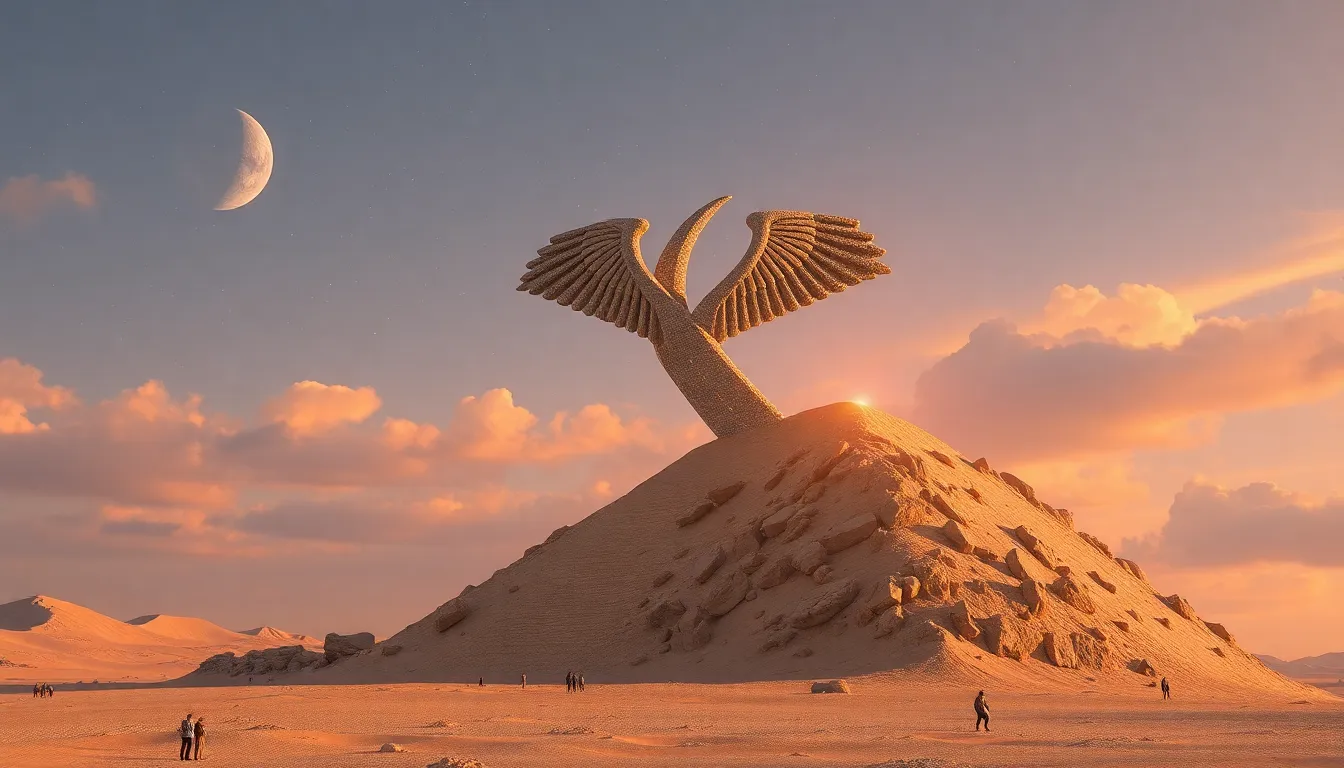The Concept of Infinity in Egyptian Cosmological Thought
I. Introduction
Infinity is a profound concept that transcends both philosophical and mathematical contexts. In philosophy, it often pertains to the limitless nature of existence and the universe, while in mathematics, it represents an unbounded quantity. Ancient Egyptian cosmology, rich in symbolism and deeply intertwined with their understanding of the universe, offers unique insights into the concept of infinity.
This article aims to explore the significance of infinity within Egyptian cosmological thought, examining historical contexts, the nature of the universe as perceived by the Egyptians, and the role of deities and afterlife beliefs. By delving into these aspects, we can gain a deeper understanding of how the ancient Egyptians conceptualized infinity and its relevance to their culture.
II. Historical Context of Egyptian Cosmology
The ancient Egyptians had a complex worldview that was deeply connected to their environment, religion, and culture. They perceived the universe as a harmonious balance between order and chaos, with various deities representing different aspects of existence.
Key texts such as the Pyramid Texts and the Coffin Texts provide insight into their cosmological beliefs, detailing creation myths and the nature of the afterlife. Artifacts, including temple inscriptions and tomb paintings, further illustrate their understanding of the cosmos and its infinite characteristics.
The geography of Egypt, particularly the Nile River and its cyclical flooding, influenced their cosmological thought, leading to a belief in the cyclical nature of life and death, which resonates with the idea of infinity.
III. The Nature of the Universe in Egyptian Thought
Central to Egyptian cosmology is the dichotomy between chaos (Nun) and order (Ma’at). Nun represents the primordial waters of chaos from which all creation emerged, while Ma’at symbolizes the order and balance that sustain the universe.
The cyclical nature of time and existence is pivotal in Egyptian thought, where life, death, and rebirth are seen as an ongoing cycle. Creation myths, such as the story of Atum creating the world from Nun, highlight the infinite potential within chaos, leading to the ordered universe.
Creation Myths and Their Relation to Infinity
- The emergence of Atum from Nun symbolizes the beginning of creation.
- Atum’s self-creation reflects the concept of infinite potential within the chaos.
- The cyclical rebirth of the sun each day illustrates the endless cycles of existence.
IV. Deities and Infinity
Deities played a crucial role in Egyptian cosmological thought, with major gods such as Atum, Ra, and Osiris embodying various aspects of existence and infinity. Atum, often considered the first god, represents the initial state of existence and the infinite potential of creation.
The symbolism of infinity is also evident in Egyptian mythology through the ouroboros, a serpent eating its own tail, representing the cyclical nature of life and the eternal cycle of creation and destruction.
The relationship between gods and the concept of eternal life underscores the Egyptians’ belief in immortality, where the soul continues to exist beyond physical death, further reinforcing the idea of infinity.
V. The Afterlife and Concepts of Eternity
Beliefs surrounding the afterlife were central to Egyptian cosmology. The Egyptians viewed death not as an end but as a transition to another existence. The journey through the Duat (the underworld) is depicted as a complex and infinite realm where the soul navigates various challenges before reaching the afterlife.
The significance of tombs and burial practices reflects their understanding of infinity, as these structures were designed to ensure the deceased’s passage to the afterlife and their continued existence beyond death.
The Journey Through the Duat
- The Duat is filled with infinite dimensions and challenges that the soul must navigate.
- Deities such as Anubis guide souls through the afterlife, emphasizing the connection between life and eternity.
- The judgment of the heart against the feather of Ma’at determines the soul’s fate, reinforcing the idea of moral order in the infinite cycle of existence.
VI. Mathematics and Geometry in Ancient Egypt
The ancient Egyptians utilized mathematics to understand and model their cosmological beliefs. Their advanced knowledge of geometry played a vital role in temple and pyramid construction, symbolizing their understanding of the universe’s order.
Mathematical concepts such as ratios and proportions were essential in aligning structures with celestial bodies, reflecting their desire to create a microcosm of the universe on Earth.
Implications of Mathematical Concepts for Understanding Infinity
- The use of geometry in construction demonstrates the Egyptians’ grasp of infinite principles in spatial arrangements.
- Mathematics allowed them to predict astronomical events, linking their understanding of infinity to the cosmos.
- Geometry’s applications in sacred architecture symbolize the connection between earthly existence and infinite divine order.
VII. Comparative Analysis: Egyptian vs. Other Ancient Cultures
When comparing Egyptian concepts of infinity with those of other ancient cultures, such as the Greeks and Mesopotamians, distinct differences and similarities emerge. While Greek philosophers like Plato explored the concept of infinity in abstract terms, the Egyptians integrated it with their religious and cosmological beliefs.
Moreover, Egyptian thought influenced later philosophical and cosmological theories, particularly in the realms of eternal life and cyclical existence.
The legacy of Egyptian infinity is evident in contemporary discussions about the nature of the universe, time, and existence, highlighting their lasting impact on human thought.
VIII. Conclusion
In summary, the concept of infinity in Egyptian cosmology is a multifaceted idea that intertwines with their beliefs about the universe, deities, the afterlife, and mathematics. The Egyptians viewed infinity not merely as an abstract concept but as a vital aspect of their existence, deeply embedded in their religious and cultural practices.
Reflecting on these ancient ideas provides valuable insights into modern philosophical discourse, where concepts of time, existence, and the universe continue to be explored. Further research into Egyptian cosmology can uncover even more about how this ancient civilization grappled with the infinite, influencing both their own world and future generations.



